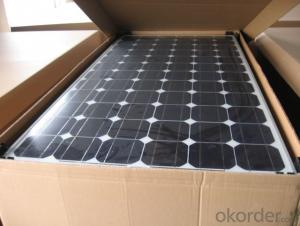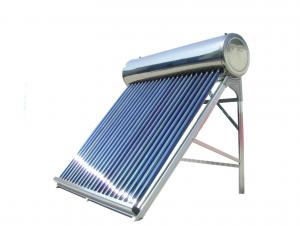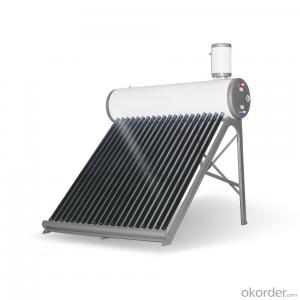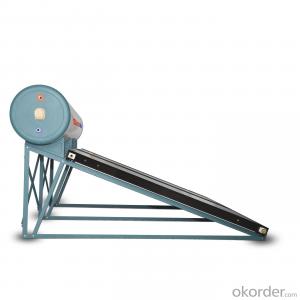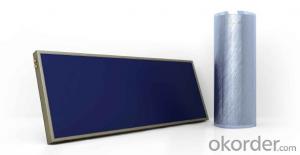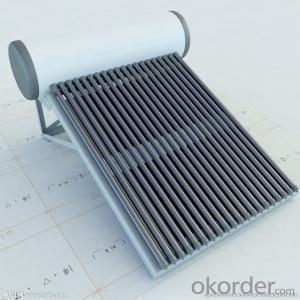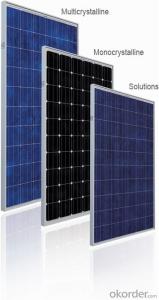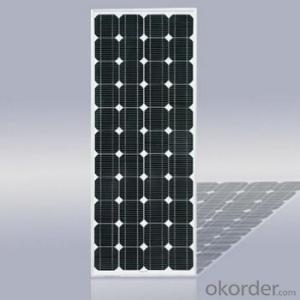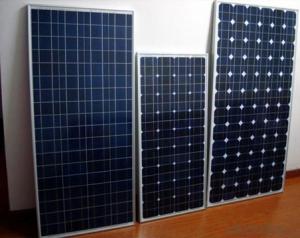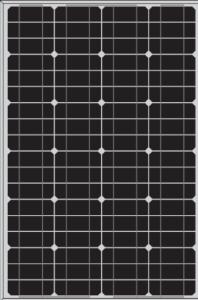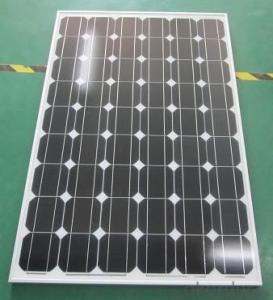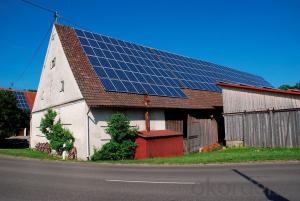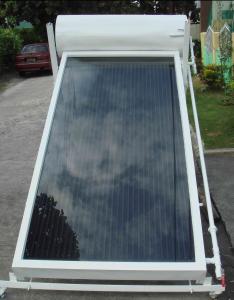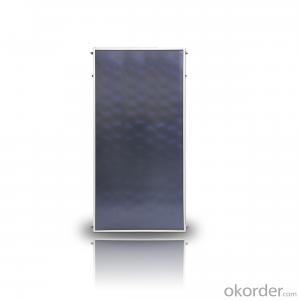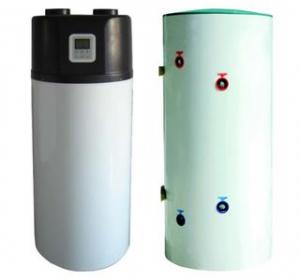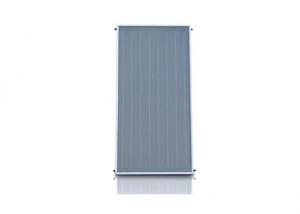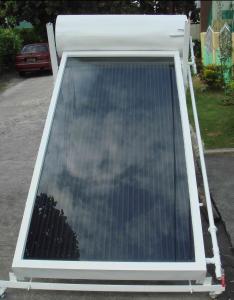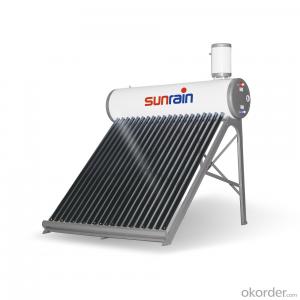CNBM Solar Monocrystalline Series Panels for Solar Water Heater for Chickens
- Loading Port:
- Tianjin
- Payment Terms:
- TT OR LC
- Min Order Qty:
- 1 pallet
- Supply Capability:
- 100000000 pallet/month
OKorder Service Pledge
OKorder Financial Service
You Might Also Like
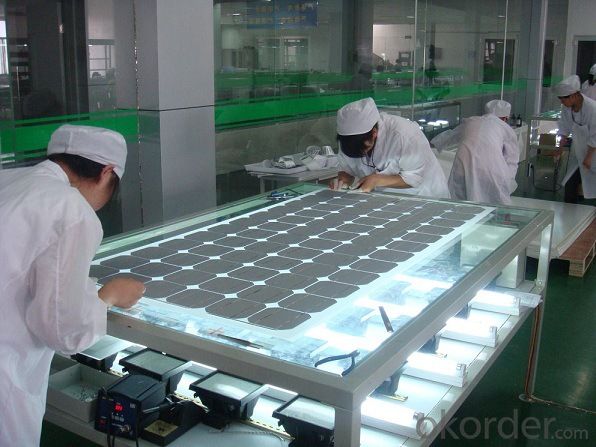
Product Description:
Solar Monocrystalline Series Panels
Introduction of Solar Monocrystalline Series Panels
CNBM Solar photovoltaic (PV) Panel is designed for large electrical power requirements. It is the optimal choice for both on-grid and off-grid power systems. CNBM Solar panel offers high performance of power per square foot of solar array. Monocrystalline silicon(c-Si): often made using the Czochralski process. Single-crystal wafer cells tend to be expensive, and because they are cut from cylindrical ingots, do not completely cover a square solar cell module without a substantial waste of refined silicon. Hence most c-Si panels have uncovered gaps at the four corners of the cells.
Characteristics of Solar Monocrystalline Series Panels
I Solar Cell : High efficiency crystalline solar cell. Even if under the weak light, the solar module can produce maximum power output.
II Tempered glass (toughened glass): Anti-reflecting coating and high transmission rate glass increase the power output and mechanical strength of solar module.
III EVA and TPT: Using high quality EVA and TPT to prevent destroying and water.
IV AI frame: Without screw, corner connection. 6 holes on the frame can be installed easily.
V Junction box: Multi function junction box with water proof.
VI Long lifetime: ≥25 years; Less power decrease
VII Good performance of preventing from atrocious weather such as wind and hails.
VIII Resisting moisture and etching effectively, not effected by geology.
Standard Test Conditions of Solar Monocrystalline Series Panels
The opto-electrical specifications shown below are stabilized values being measured at Standard Test Conditions, Irradiance: 1000W/m2, Spectrum: AM1.5 at 25°C, The info below is subject to manufacturing tolerances. Where appropriate minutes of measurement are available and are used for the dimensioning of the installation.
Advantages of Solar Monocrystalline Series Panels
• CNBM Solar performance guarantees for 25 years
• 12 years guarantee for workmanship
• Timeliness of delivery
CNBM International Corporation's products including Monocrystalline Solar Panel, Polycrystalline Solar Panel have received and enjoyed famous reputation in many countries and regions in the world .As a solar panel supplier in China, we strive to provide our customers with excellent service, superior products and unmatched value.
Characteristics of Solar Monocrystalline Series Panels
Max Power Voltage Vmp (V) | 18.4V | 17.6V |
Max Power Current Imp (A) | 6.52A | 7.39A |
Open Circuit Voltage Voc (V) | 23.0V | 22.2V |
Short Circuit Current Isc (A) | 6.97A | 7.90A |
Max Power Pm (W) | 120W | 130W |
Temperature Coefficient of Cells
NOCT | 47℃±2℃ |
Temperature Coefficients of Isc (%/℃) | 0.064 |
Temperature Coefficients of Voc (%/℃) | -0.33 |
Temperature Coefficients of Pmp (%/℃) | -0.45 |
Mechanical Data Solar Monocrystalline Series
Power | 120W/130W |
Dimension | 1190/1470×670×30mm |
Weight | 9.5kg/11.7kg |
Tolerance | ±3% |
The dimension of the modules can be changed according to the demand of clients
Limits
Operating Temperature | –40 °C to +85°C |
Storage Temperature | –40 °C to +85°C |
Max System Voltage | 700V |
Guarantee Solar Monocrystalline Series Panels
Products Guarantee | 10 yrs free from defects in materials and workmanship |
Performance Guarantee | No less than 90% within 10yrs and no less than 80% within 25yrs |
Certificates | IEC, ISO, TUV, CE |
FAQ
We have organized several common questions for our clients,may help you sincerely:
1. What’s price per watt?
A: It’s depends on the quantity, delivery date and payment terms of the order. We can talk further about the detail price issue. Our products is high quality with lower price level.
2. Can you tell me the parameter of your solar panels?
We have different series of cells with different power output, both from c-si to a-si. Please take our specification sheet for your reference.
3. How do you pack your products?
We have rich experience on how to pack the panels to make sure the safety on shipment when it arrives at the destination.
4. Can you do OEM for us?
Yes, we can.
5. How long can we receive the product after purchase?
In the purchase of product within three working days, We will arrange the factory delivery as soon as possible. The perfect time of receiving is related to the state and position of customers. Commonly 7 to 10 working days can be served.
- Q: How does a solar water heater affect water heater heat loss?
- A solar water heater can significantly reduce water heater heat loss by utilizing the sun's energy to heat the water directly. This eliminates the need for traditional energy sources such as electricity or gas, which often result in heat loss during the heating process. Additionally, solar water heaters are equipped with insulation and efficient circulation systems, further minimizing heat loss and ensuring optimal energy utilization.
- Q: Air water heater advantages and disadvantages?
- 1 advantages: environmental protection and energy saving, because air heaters can not use gas, will not produce gas, so as not to destroy the ozone layer, but also because it saves the electricity, and reduce the consumption of electricity per time, can reduce the power of the 1.5 pounds of carbon dioxide, also can reduce the damage to the ozone layer. Therefore, the use of air heaters can also delay the warming of the earth"
- Q: Can a solar water heater be used in areas with limited access to energy-saving technologies?
- Yes, a solar water heater can be used in areas with limited access to energy-saving technologies. Solar water heaters do not require electricity to operate as they rely on the sun's energy to heat water. Therefore, they can be an effective and sustainable solution for providing hot water in areas where other energy-saving technologies may not be readily available.
- Q: Can a solar water heater be used in areas with high levels of wind erosion?
- Yes, a solar water heater can be used in areas with high levels of wind erosion. The performance of the solar water heater may not be affected by wind erosion, as long as the system is properly installed and maintained. However, it is important to ensure that the solar water heater is protected against any physical damage caused by windblown particles or debris.
- Q: Can a solar water heater be used in areas with limited access to government support or incentives for renewable energy?
- Yes, a solar water heater can still be used in areas with limited access to government support or incentives for renewable energy. While financial incentives and government support can certainly make the adoption of renewable energy technologies more affordable and accessible, solar water heaters can still be a viable and cost-effective option for households or communities in such areas. The initial investment may be higher, but the long-term benefits of reduced energy costs and environmental impact can still make it a worthwhile investment. Additionally, community-driven initiatives, non-profit organizations, or microfinance options can sometimes provide alternative means of financing or support for renewable energy projects in areas with limited government incentives.
- Q: Can a solar water heater be used in areas with limited access to sunlight for an extended period?
- A solar water heater may not be an ideal choice for areas with limited access to sunlight for an extended period. Solar water heaters rely on sunlight to heat the water, so if there is limited sunlight, they may not be able to generate enough heat to meet the desired water temperature. In such areas, alternative options like electric or gas water heaters would be more suitable.
- Q: How does the cost of a solar water heater compare to traditional water heaters?
- The price of a solar water heater can differ depending on various factors such as its size, brand, and installation requirements. Typically, the initial cost of a solar water heater is higher compared to that of a conventional water heater. The average price range for a solar water heater, including installation, is between $2,000 and $5,000. On the other hand, traditional water heaters, including installation, can range from $500 to $1,500. Nevertheless, when considering long-term expenses, solar water heaters are usually more cost-effective. They utilize sunlight as an energy source to heat water, which means they rely on a free and renewable source of power. This results in reduced energy consumption and lower utility bills. In contrast, traditional water heaters depend on electricity or gas, leading to higher energy costs in the long run. Furthermore, solar water heaters tend to have a longer lifespan compared to traditional ones. While conventional water heaters typically last around 10-15 years, solar water heaters can last up to 20-30 years with proper maintenance. This extended lifespan contributes to additional savings over time, as traditional water heaters may require replacement sooner. Additionally, there are various federal, state, and local incentives and tax credits available for solar water heaters. These further decrease the overall cost, helping to offset the initial investment and making solar water heaters more affordable in the long term. To summarize, although the upfront cost of a solar water heater is higher than that of a traditional water heater, the long-term cost savings, energy efficiency, and extended lifespan make solar water heaters a more economically advantageous choice. Moreover, the availability of incentives and tax credits can help mitigate the initial investment, making solar water heaters a financially viable and environmentally friendly option.
- Q: What are the requirements of domestic solar water heater? What are the advantages and disadvantages of solar water heater
- Advantages and disadvantages of solar water heater:Advantage:1 high tech products, copper aluminum anode polarization composite plate core or all purple copper core, high surface treatment process, good heat transfer performance, strong absorption capacity, water production;2 the system has good heat preservation performance, large heat storage energy, and the heat preservation water tank has the function of water storage. The utility model can meet the requirement of large quantities of personnel to use hot water, and can also be used as an emergency water source for water supply without water supply;3 solar water heater system for automatic static operation, without special care, no noise, no pollution, no leakage, poisoning, fire danger, safety, environmental protection and energy saving benefits;4 with sewage purification function, clean water pollution;5 vacuum tube solar water heater with good thermal insulation performance, strong frost resistance.
- Q: Can a solar water heater be used in all climates?
- Yes, a solar water heater can be used in all climates. However, the effectiveness and efficiency of the system may vary depending on the climate. In colder climates, additional insulation and antifreeze measures may be required to prevent freezing and optimize performance. In contrast, in warmer climates, solar water heaters tend to be more efficient due to increased sunlight availability. Overall, while a solar water heater can be used in all climates, the specific design and configuration may need to be adapted to suit the local climate conditions.
- Q: Are there any disadvantages to using a solar water heater?
- Yes, there are a few disadvantages to using a solar water heater. Firstly, the initial cost of purchasing and installing a solar water heater can be relatively high compared to traditional water heaters. Additionally, the efficiency of solar water heaters can be affected by weather conditions, such as cloudy or rainy days, leading to reduced heating capacity. Maintenance and repairs may also require specialized knowledge and can be more expensive. Finally, the physical space required for installing solar panels and storage tanks can be a limitation for some households or buildings.
Send your message to us
CNBM Solar Monocrystalline Series Panels for Solar Water Heater for Chickens
- Loading Port:
- Tianjin
- Payment Terms:
- TT OR LC
- Min Order Qty:
- 1 pallet
- Supply Capability:
- 100000000 pallet/month
OKorder Service Pledge
OKorder Financial Service
Similar products
Hot products
Hot Searches
Related keywords
